Taxation Law: Australian Sharing Economy, GST and Overseas Supplies
VerifiedAdded on 2022/10/04
|14
|3562
|25
Report
AI Summary
This report provides a comprehensive analysis of the tax implications associated with the rise of the sharing economy in Australia, focusing on platforms such as Uber, Airbnb, and Netflix. It examines the current taxation laws, including Goods and Services Tax (GST), and addresses the challenges posed by overseas suppliers in the digital economy. The report delves into the working models of these platforms, differentiating between employees and independent contractors, and explores the application of GST to their operations. It further investigates whether Airbnb activities are classified as a business or a hobby, and analyzes the international approaches to taxing the sharing economy, drawing comparisons with the United States, the United Kingdom, and Europe. The report also discusses the government's concerns regarding tax compliance and proposes potential solutions to address the identified issues, providing valuable insights into the evolving landscape of taxation in the context of the sharing economy.
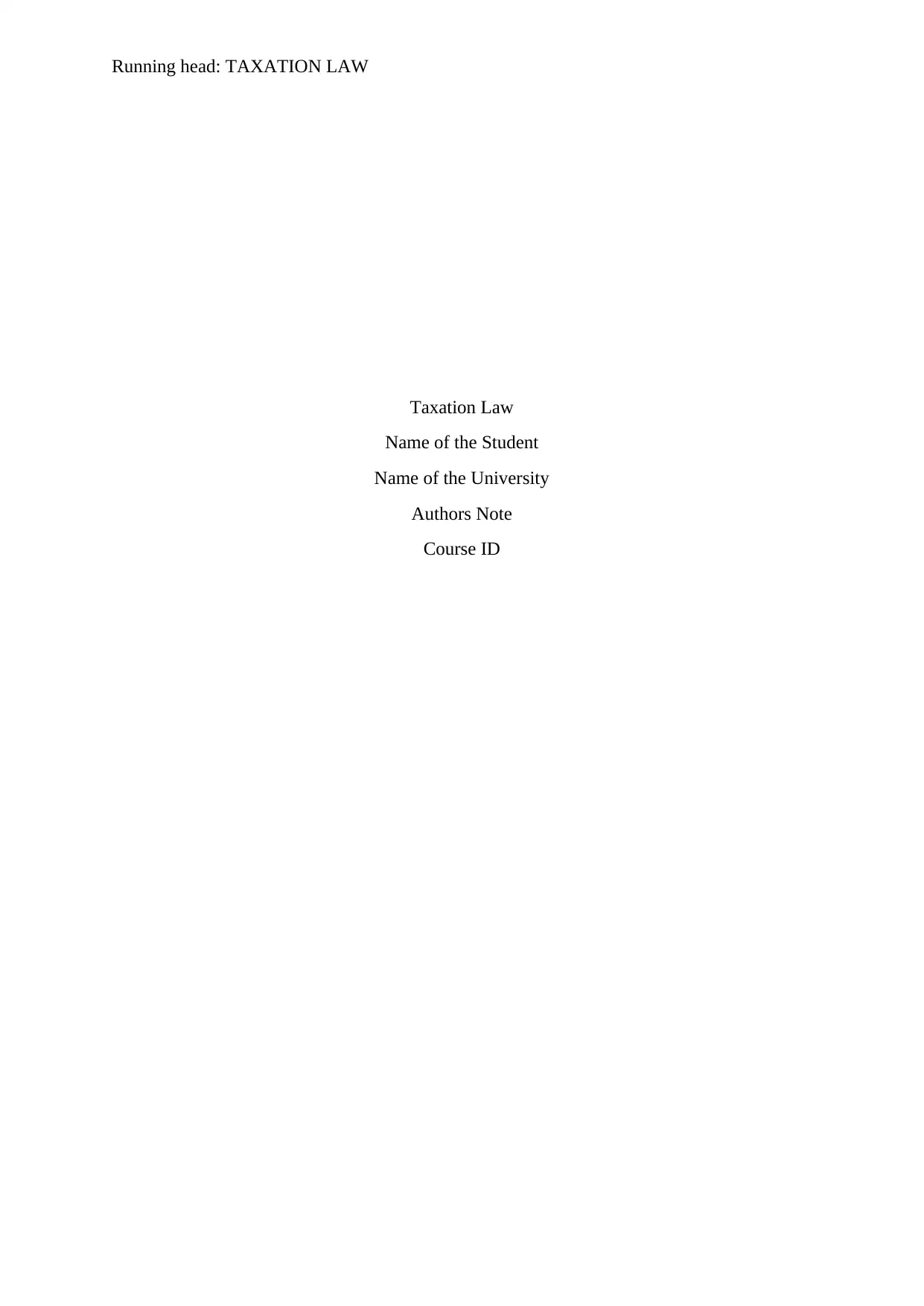
Running head: TAXATION LAW
Taxation Law
Name of the Student
Name of the University
Authors Note
Course ID
Taxation Law
Name of the Student
Name of the University
Authors Note
Course ID
Paraphrase This Document
Need a fresh take? Get an instant paraphrase of this document with our AI Paraphraser
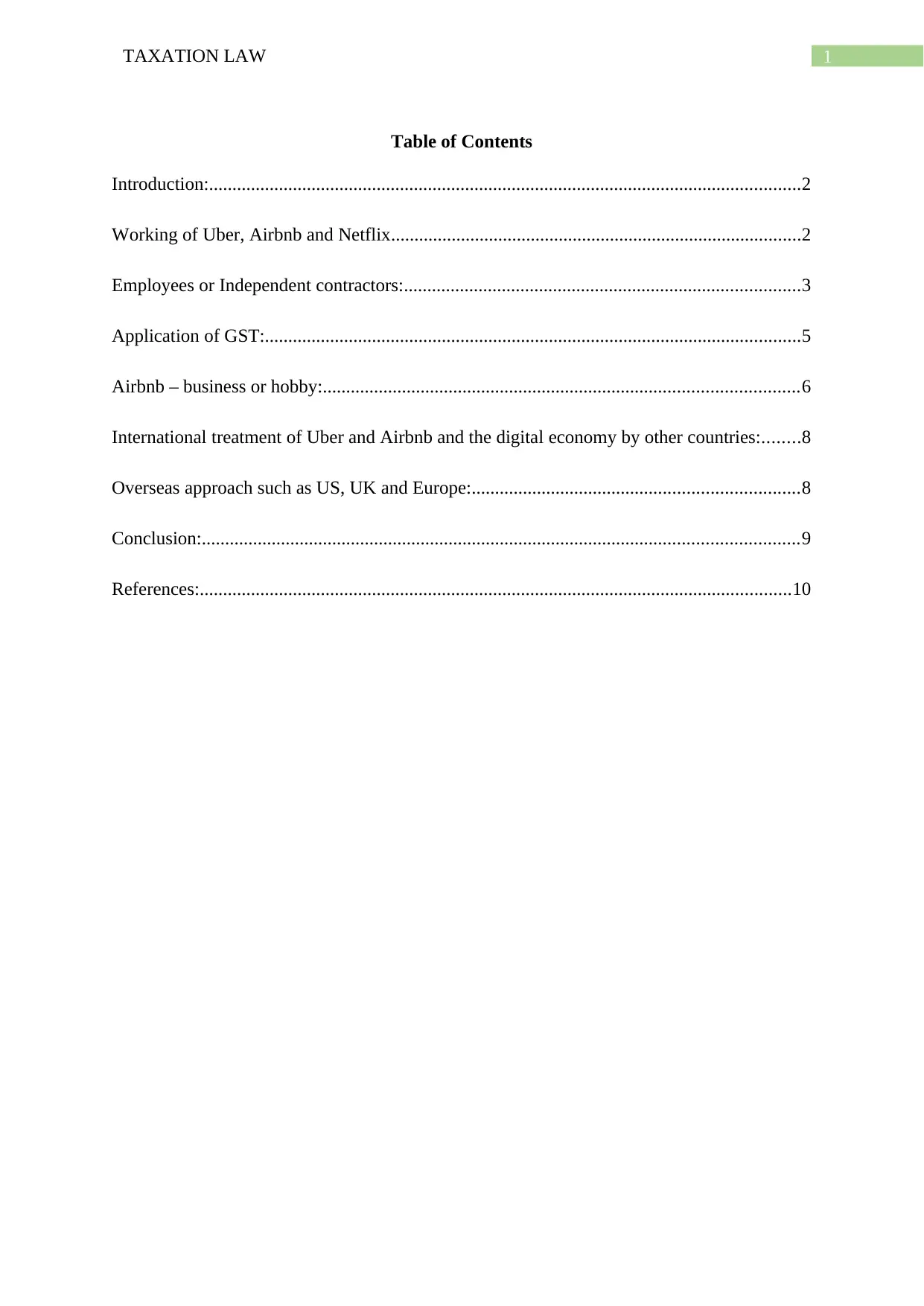
1TAXATION LAW
Table of Contents
Introduction:...............................................................................................................................2
Working of Uber, Airbnb and Netflix........................................................................................2
Employees or Independent contractors:.....................................................................................3
Application of GST:...................................................................................................................5
Airbnb – business or hobby:......................................................................................................6
International treatment of Uber and Airbnb and the digital economy by other countries:........8
Overseas approach such as US, UK and Europe:......................................................................8
Conclusion:................................................................................................................................9
References:...............................................................................................................................10
Table of Contents
Introduction:...............................................................................................................................2
Working of Uber, Airbnb and Netflix........................................................................................2
Employees or Independent contractors:.....................................................................................3
Application of GST:...................................................................................................................5
Airbnb – business or hobby:......................................................................................................6
International treatment of Uber and Airbnb and the digital economy by other countries:........8
Overseas approach such as US, UK and Europe:......................................................................8
Conclusion:................................................................................................................................9
References:...............................................................................................................................10
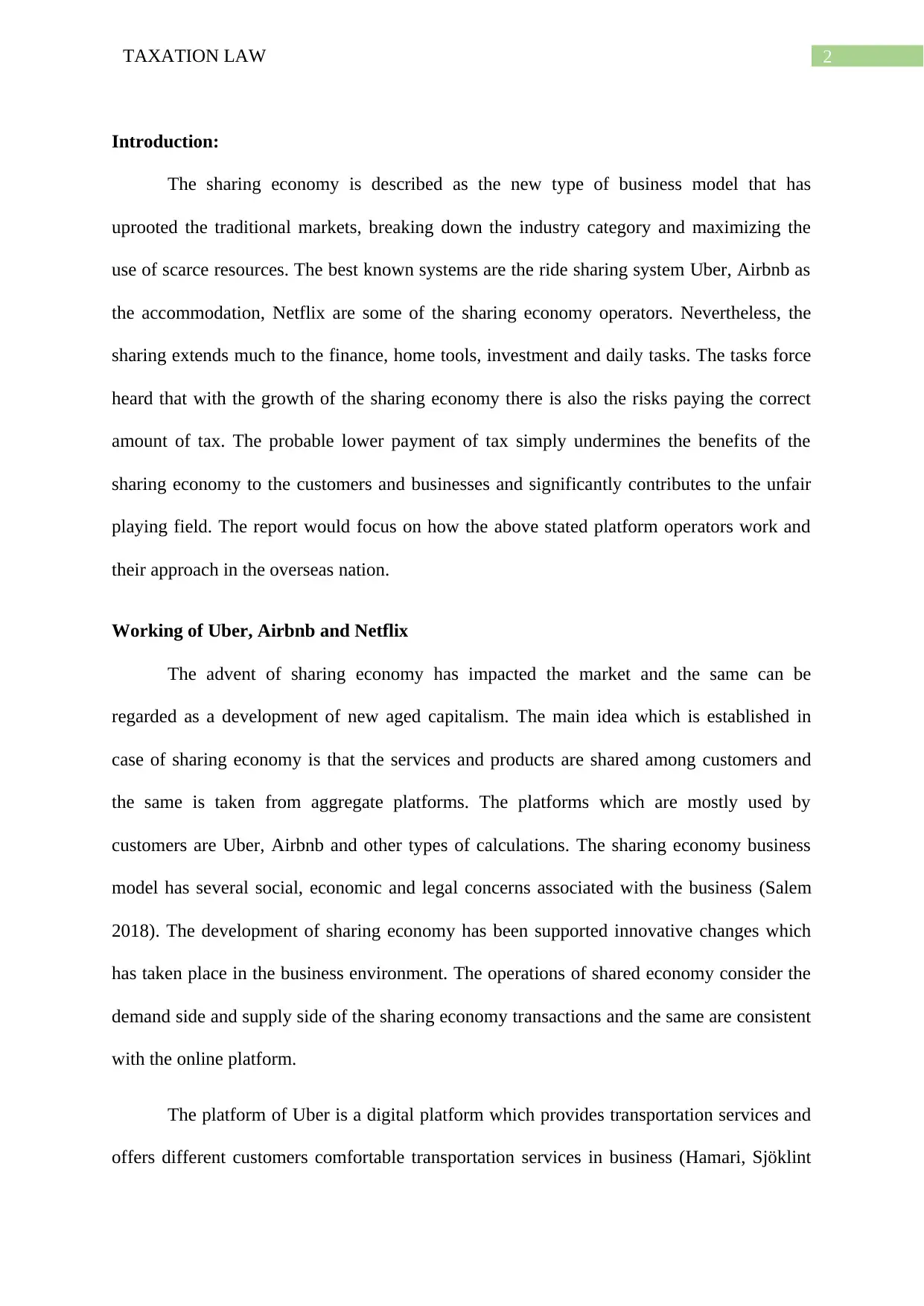
2TAXATION LAW
Introduction:
The sharing economy is described as the new type of business model that has
uprooted the traditional markets, breaking down the industry category and maximizing the
use of scarce resources. The best known systems are the ride sharing system Uber, Airbnb as
the accommodation, Netflix are some of the sharing economy operators. Nevertheless, the
sharing extends much to the finance, home tools, investment and daily tasks. The tasks force
heard that with the growth of the sharing economy there is also the risks paying the correct
amount of tax. The probable lower payment of tax simply undermines the benefits of the
sharing economy to the customers and businesses and significantly contributes to the unfair
playing field. The report would focus on how the above stated platform operators work and
their approach in the overseas nation.
Working of Uber, Airbnb and Netflix
The advent of sharing economy has impacted the market and the same can be
regarded as a development of new aged capitalism. The main idea which is established in
case of sharing economy is that the services and products are shared among customers and
the same is taken from aggregate platforms. The platforms which are mostly used by
customers are Uber, Airbnb and other types of calculations. The sharing economy business
model has several social, economic and legal concerns associated with the business (Salem
2018). The development of sharing economy has been supported innovative changes which
has taken place in the business environment. The operations of shared economy consider the
demand side and supply side of the sharing economy transactions and the same are consistent
with the online platform.
The platform of Uber is a digital platform which provides transportation services and
offers different customers comfortable transportation services in business (Hamari, Sjöklint
Introduction:
The sharing economy is described as the new type of business model that has
uprooted the traditional markets, breaking down the industry category and maximizing the
use of scarce resources. The best known systems are the ride sharing system Uber, Airbnb as
the accommodation, Netflix are some of the sharing economy operators. Nevertheless, the
sharing extends much to the finance, home tools, investment and daily tasks. The tasks force
heard that with the growth of the sharing economy there is also the risks paying the correct
amount of tax. The probable lower payment of tax simply undermines the benefits of the
sharing economy to the customers and businesses and significantly contributes to the unfair
playing field. The report would focus on how the above stated platform operators work and
their approach in the overseas nation.
Working of Uber, Airbnb and Netflix
The advent of sharing economy has impacted the market and the same can be
regarded as a development of new aged capitalism. The main idea which is established in
case of sharing economy is that the services and products are shared among customers and
the same is taken from aggregate platforms. The platforms which are mostly used by
customers are Uber, Airbnb and other types of calculations. The sharing economy business
model has several social, economic and legal concerns associated with the business (Salem
2018). The development of sharing economy has been supported innovative changes which
has taken place in the business environment. The operations of shared economy consider the
demand side and supply side of the sharing economy transactions and the same are consistent
with the online platform.
The platform of Uber is a digital platform which provides transportation services and
offers different customers comfortable transportation services in business (Hamari, Sjöklint
⊘ This is a preview!⊘
Do you want full access?
Subscribe today to unlock all pages.

Trusted by 1+ million students worldwide
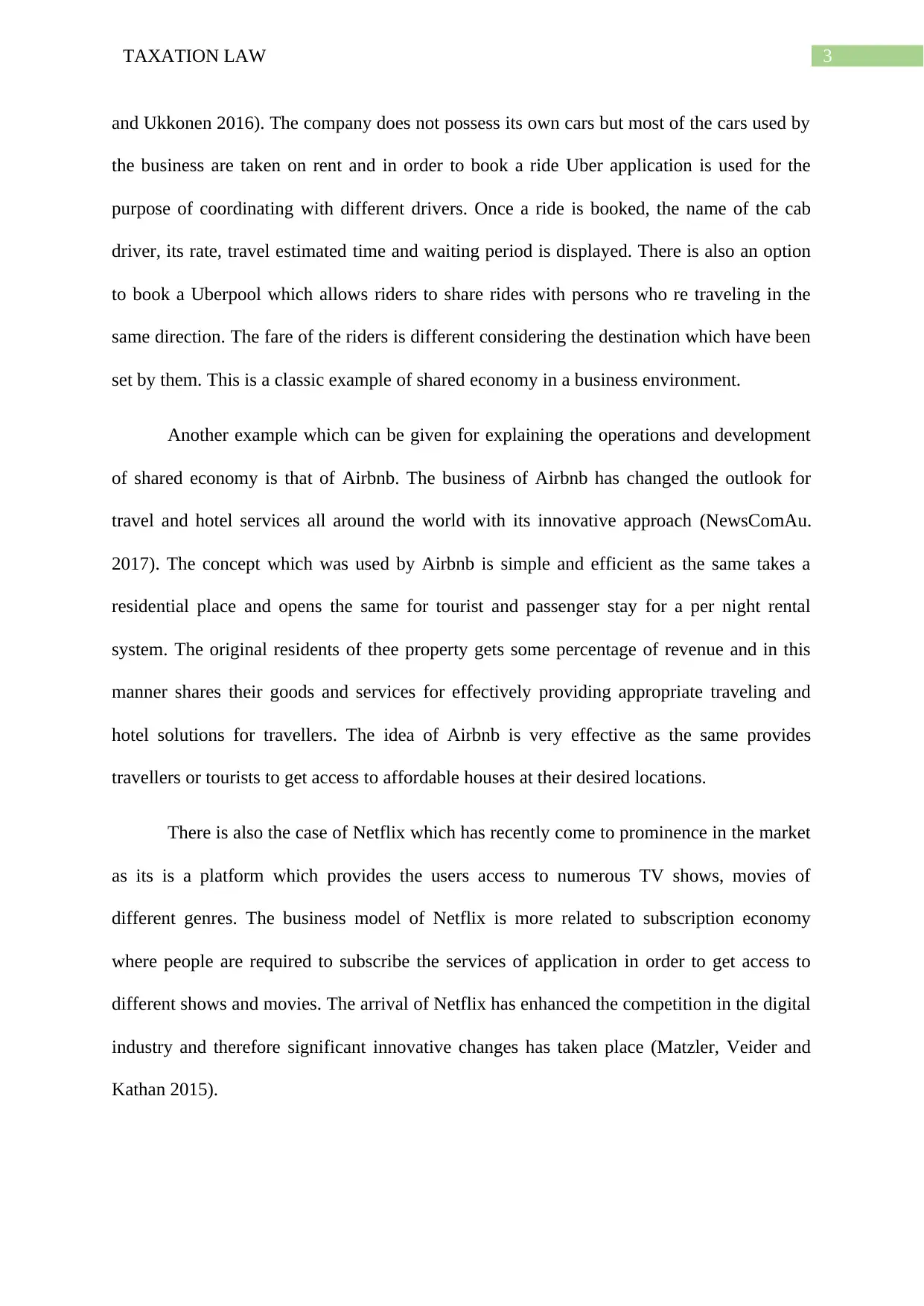
3TAXATION LAW
and Ukkonen 2016). The company does not possess its own cars but most of the cars used by
the business are taken on rent and in order to book a ride Uber application is used for the
purpose of coordinating with different drivers. Once a ride is booked, the name of the cab
driver, its rate, travel estimated time and waiting period is displayed. There is also an option
to book a Uberpool which allows riders to share rides with persons who re traveling in the
same direction. The fare of the riders is different considering the destination which have been
set by them. This is a classic example of shared economy in a business environment.
Another example which can be given for explaining the operations and development
of shared economy is that of Airbnb. The business of Airbnb has changed the outlook for
travel and hotel services all around the world with its innovative approach (NewsComAu.
2017). The concept which was used by Airbnb is simple and efficient as the same takes a
residential place and opens the same for tourist and passenger stay for a per night rental
system. The original residents of thee property gets some percentage of revenue and in this
manner shares their goods and services for effectively providing appropriate traveling and
hotel solutions for travellers. The idea of Airbnb is very effective as the same provides
travellers or tourists to get access to affordable houses at their desired locations.
There is also the case of Netflix which has recently come to prominence in the market
as its is a platform which provides the users access to numerous TV shows, movies of
different genres. The business model of Netflix is more related to subscription economy
where people are required to subscribe the services of application in order to get access to
different shows and movies. The arrival of Netflix has enhanced the competition in the digital
industry and therefore significant innovative changes has taken place (Matzler, Veider and
Kathan 2015).
and Ukkonen 2016). The company does not possess its own cars but most of the cars used by
the business are taken on rent and in order to book a ride Uber application is used for the
purpose of coordinating with different drivers. Once a ride is booked, the name of the cab
driver, its rate, travel estimated time and waiting period is displayed. There is also an option
to book a Uberpool which allows riders to share rides with persons who re traveling in the
same direction. The fare of the riders is different considering the destination which have been
set by them. This is a classic example of shared economy in a business environment.
Another example which can be given for explaining the operations and development
of shared economy is that of Airbnb. The business of Airbnb has changed the outlook for
travel and hotel services all around the world with its innovative approach (NewsComAu.
2017). The concept which was used by Airbnb is simple and efficient as the same takes a
residential place and opens the same for tourist and passenger stay for a per night rental
system. The original residents of thee property gets some percentage of revenue and in this
manner shares their goods and services for effectively providing appropriate traveling and
hotel solutions for travellers. The idea of Airbnb is very effective as the same provides
travellers or tourists to get access to affordable houses at their desired locations.
There is also the case of Netflix which has recently come to prominence in the market
as its is a platform which provides the users access to numerous TV shows, movies of
different genres. The business model of Netflix is more related to subscription economy
where people are required to subscribe the services of application in order to get access to
different shows and movies. The arrival of Netflix has enhanced the competition in the digital
industry and therefore significant innovative changes has taken place (Matzler, Veider and
Kathan 2015).
Paraphrase This Document
Need a fresh take? Get an instant paraphrase of this document with our AI Paraphraser
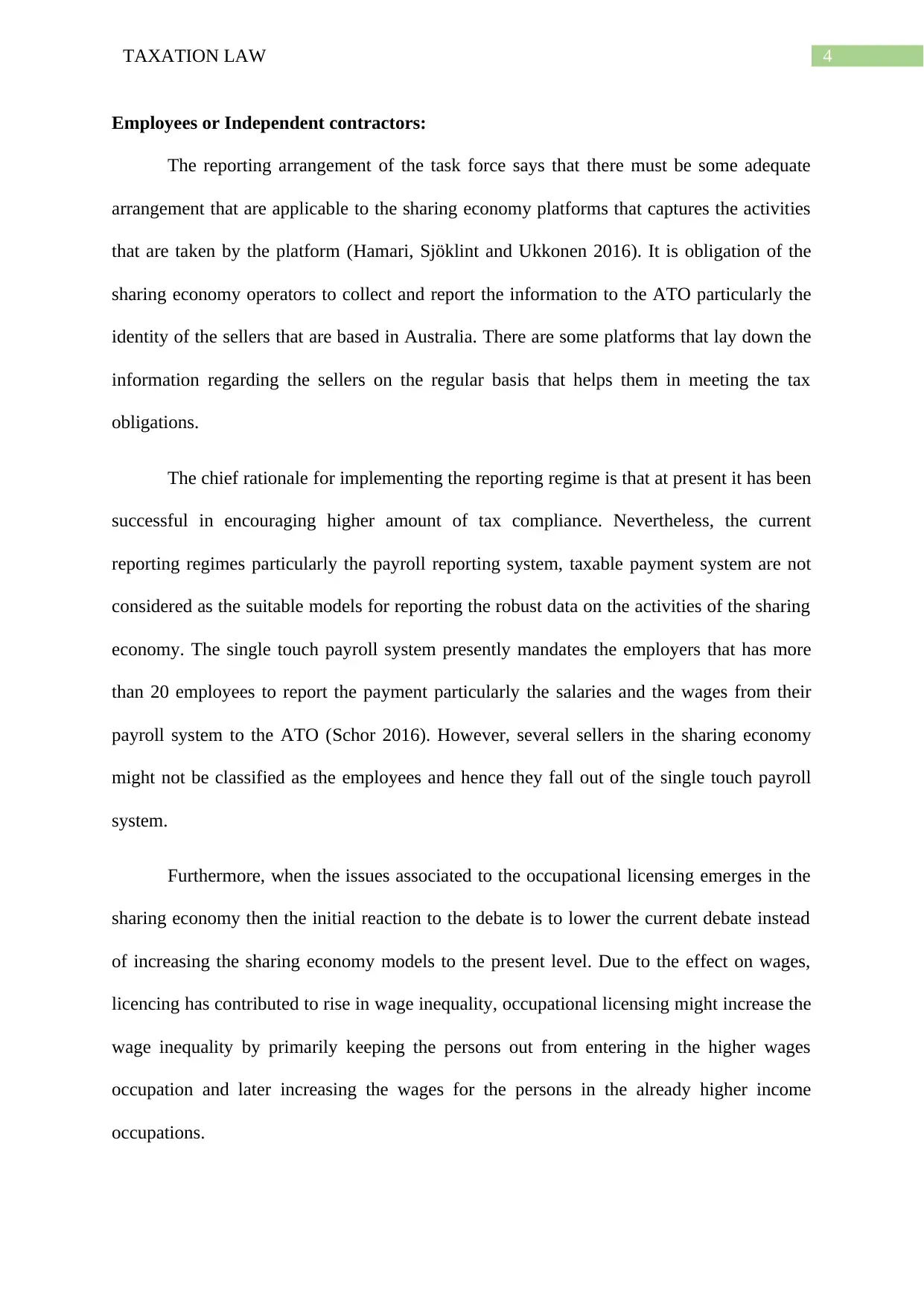
4TAXATION LAW
Employees or Independent contractors:
The reporting arrangement of the task force says that there must be some adequate
arrangement that are applicable to the sharing economy platforms that captures the activities
that are taken by the platform (Hamari, Sjöklint and Ukkonen 2016). It is obligation of the
sharing economy operators to collect and report the information to the ATO particularly the
identity of the sellers that are based in Australia. There are some platforms that lay down the
information regarding the sellers on the regular basis that helps them in meeting the tax
obligations.
The chief rationale for implementing the reporting regime is that at present it has been
successful in encouraging higher amount of tax compliance. Nevertheless, the current
reporting regimes particularly the payroll reporting system, taxable payment system are not
considered as the suitable models for reporting the robust data on the activities of the sharing
economy. The single touch payroll system presently mandates the employers that has more
than 20 employees to report the payment particularly the salaries and the wages from their
payroll system to the ATO (Schor 2016). However, several sellers in the sharing economy
might not be classified as the employees and hence they fall out of the single touch payroll
system.
Furthermore, when the issues associated to the occupational licensing emerges in the
sharing economy then the initial reaction to the debate is to lower the current debate instead
of increasing the sharing economy models to the present level. Due to the effect on wages,
licencing has contributed to rise in wage inequality, occupational licensing might increase the
wage inequality by primarily keeping the persons out from entering in the higher wages
occupation and later increasing the wages for the persons in the already higher income
occupations.
Employees or Independent contractors:
The reporting arrangement of the task force says that there must be some adequate
arrangement that are applicable to the sharing economy platforms that captures the activities
that are taken by the platform (Hamari, Sjöklint and Ukkonen 2016). It is obligation of the
sharing economy operators to collect and report the information to the ATO particularly the
identity of the sellers that are based in Australia. There are some platforms that lay down the
information regarding the sellers on the regular basis that helps them in meeting the tax
obligations.
The chief rationale for implementing the reporting regime is that at present it has been
successful in encouraging higher amount of tax compliance. Nevertheless, the current
reporting regimes particularly the payroll reporting system, taxable payment system are not
considered as the suitable models for reporting the robust data on the activities of the sharing
economy. The single touch payroll system presently mandates the employers that has more
than 20 employees to report the payment particularly the salaries and the wages from their
payroll system to the ATO (Schor 2016). However, several sellers in the sharing economy
might not be classified as the employees and hence they fall out of the single touch payroll
system.
Furthermore, when the issues associated to the occupational licensing emerges in the
sharing economy then the initial reaction to the debate is to lower the current debate instead
of increasing the sharing economy models to the present level. Due to the effect on wages,
licencing has contributed to rise in wage inequality, occupational licensing might increase the
wage inequality by primarily keeping the persons out from entering in the higher wages
occupation and later increasing the wages for the persons in the already higher income
occupations.
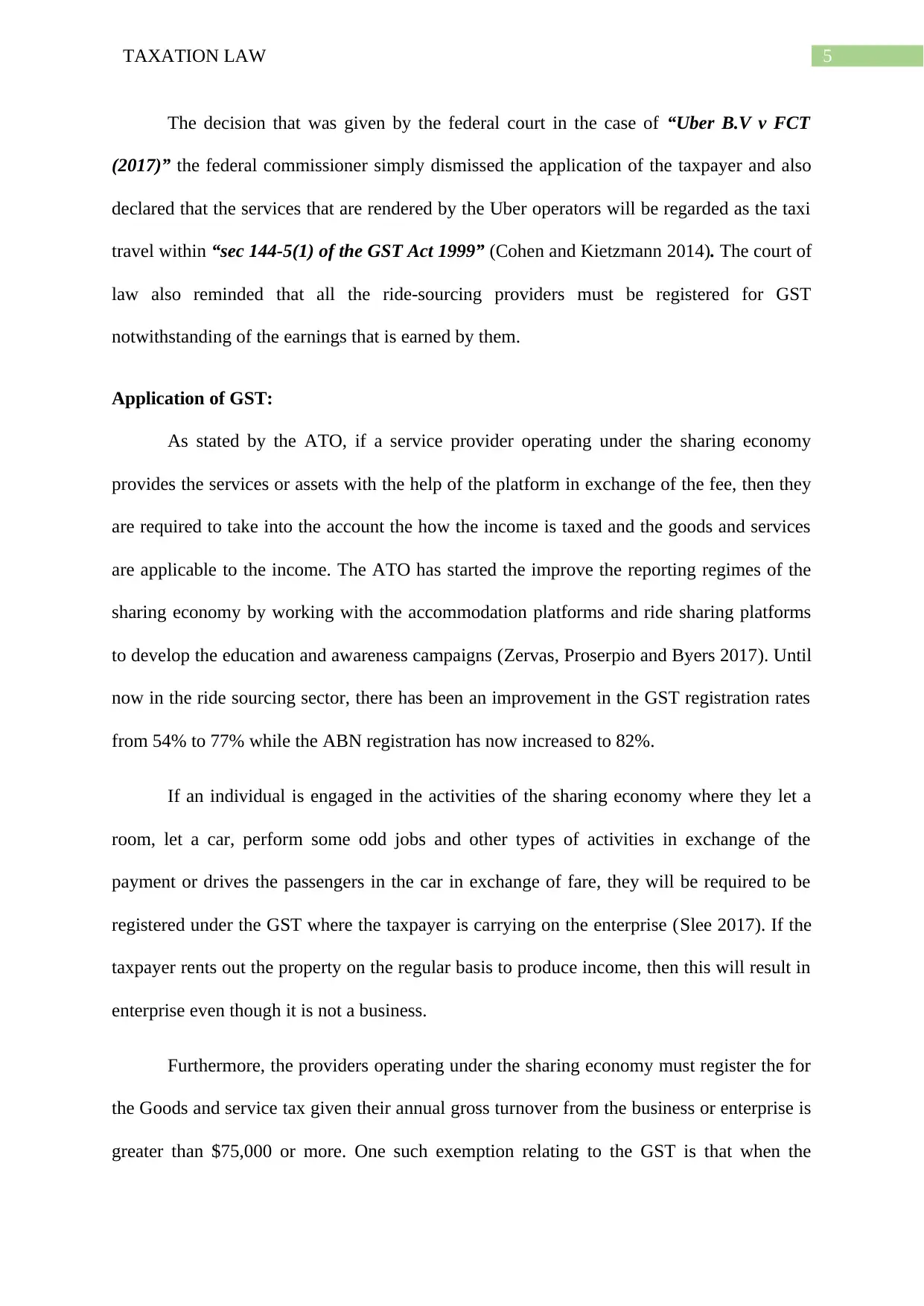
5TAXATION LAW
The decision that was given by the federal court in the case of “Uber B.V v FCT
(2017)” the federal commissioner simply dismissed the application of the taxpayer and also
declared that the services that are rendered by the Uber operators will be regarded as the taxi
travel within “sec 144-5(1) of the GST Act 1999” (Cohen and Kietzmann 2014). The court of
law also reminded that all the ride-sourcing providers must be registered for GST
notwithstanding of the earnings that is earned by them.
Application of GST:
As stated by the ATO, if a service provider operating under the sharing economy
provides the services or assets with the help of the platform in exchange of the fee, then they
are required to take into the account the how the income is taxed and the goods and services
are applicable to the income. The ATO has started the improve the reporting regimes of the
sharing economy by working with the accommodation platforms and ride sharing platforms
to develop the education and awareness campaigns (Zervas, Proserpio and Byers 2017). Until
now in the ride sourcing sector, there has been an improvement in the GST registration rates
from 54% to 77% while the ABN registration has now increased to 82%.
If an individual is engaged in the activities of the sharing economy where they let a
room, let a car, perform some odd jobs and other types of activities in exchange of the
payment or drives the passengers in the car in exchange of fare, they will be required to be
registered under the GST where the taxpayer is carrying on the enterprise (Slee 2017). If the
taxpayer rents out the property on the regular basis to produce income, then this will result in
enterprise even though it is not a business.
Furthermore, the providers operating under the sharing economy must register the for
the Goods and service tax given their annual gross turnover from the business or enterprise is
greater than $75,000 or more. One such exemption relating to the GST is that when the
The decision that was given by the federal court in the case of “Uber B.V v FCT
(2017)” the federal commissioner simply dismissed the application of the taxpayer and also
declared that the services that are rendered by the Uber operators will be regarded as the taxi
travel within “sec 144-5(1) of the GST Act 1999” (Cohen and Kietzmann 2014). The court of
law also reminded that all the ride-sourcing providers must be registered for GST
notwithstanding of the earnings that is earned by them.
Application of GST:
As stated by the ATO, if a service provider operating under the sharing economy
provides the services or assets with the help of the platform in exchange of the fee, then they
are required to take into the account the how the income is taxed and the goods and services
are applicable to the income. The ATO has started the improve the reporting regimes of the
sharing economy by working with the accommodation platforms and ride sharing platforms
to develop the education and awareness campaigns (Zervas, Proserpio and Byers 2017). Until
now in the ride sourcing sector, there has been an improvement in the GST registration rates
from 54% to 77% while the ABN registration has now increased to 82%.
If an individual is engaged in the activities of the sharing economy where they let a
room, let a car, perform some odd jobs and other types of activities in exchange of the
payment or drives the passengers in the car in exchange of fare, they will be required to be
registered under the GST where the taxpayer is carrying on the enterprise (Slee 2017). If the
taxpayer rents out the property on the regular basis to produce income, then this will result in
enterprise even though it is not a business.
Furthermore, the providers operating under the sharing economy must register the for
the Goods and service tax given their annual gross turnover from the business or enterprise is
greater than $75,000 or more. One such exemption relating to the GST is that when the
⊘ This is a preview!⊘
Do you want full access?
Subscribe today to unlock all pages.

Trusted by 1+ million students worldwide
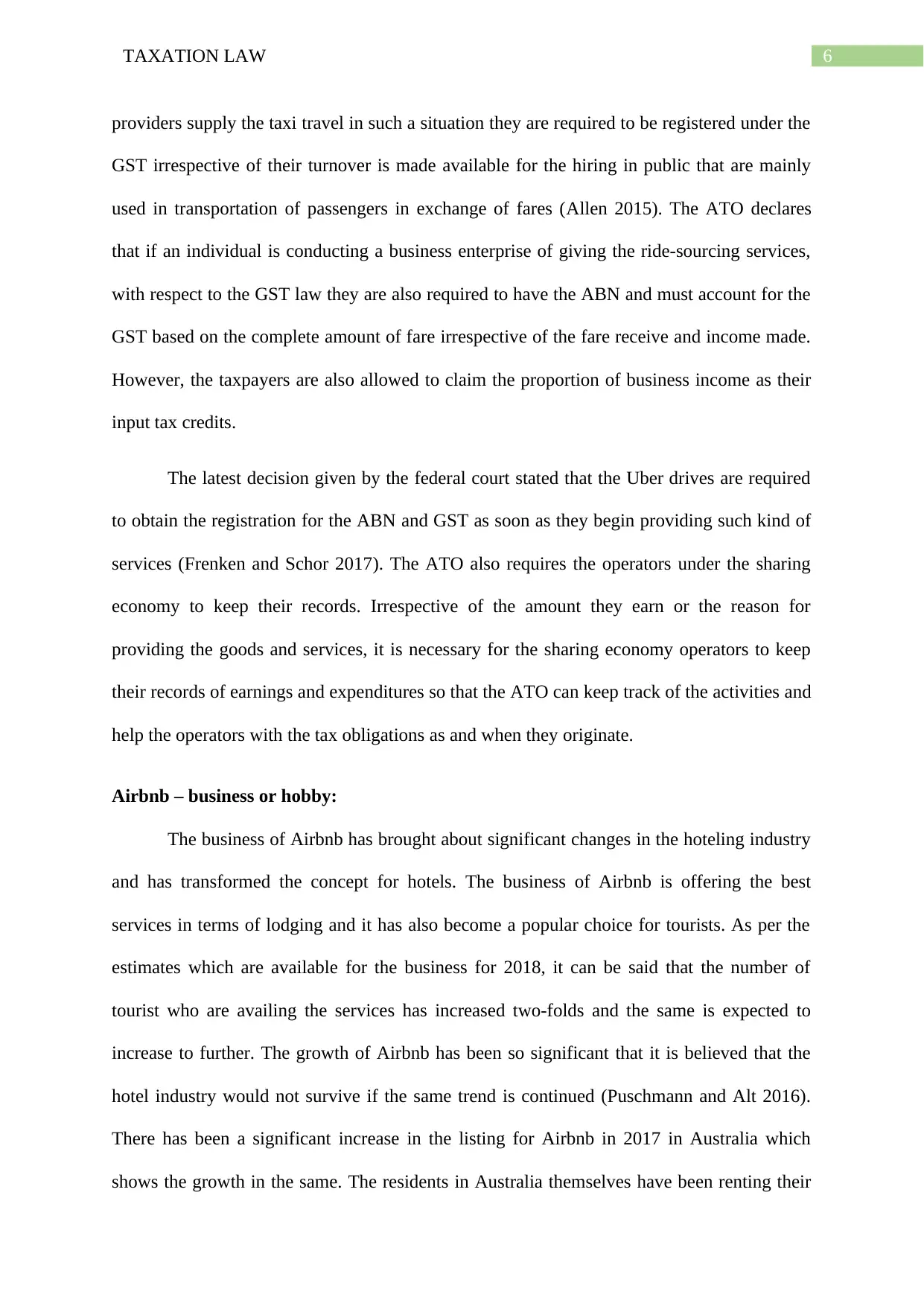
6TAXATION LAW
providers supply the taxi travel in such a situation they are required to be registered under the
GST irrespective of their turnover is made available for the hiring in public that are mainly
used in transportation of passengers in exchange of fares (Allen 2015). The ATO declares
that if an individual is conducting a business enterprise of giving the ride-sourcing services,
with respect to the GST law they are also required to have the ABN and must account for the
GST based on the complete amount of fare irrespective of the fare receive and income made.
However, the taxpayers are also allowed to claim the proportion of business income as their
input tax credits.
The latest decision given by the federal court stated that the Uber drives are required
to obtain the registration for the ABN and GST as soon as they begin providing such kind of
services (Frenken and Schor 2017). The ATO also requires the operators under the sharing
economy to keep their records. Irrespective of the amount they earn or the reason for
providing the goods and services, it is necessary for the sharing economy operators to keep
their records of earnings and expenditures so that the ATO can keep track of the activities and
help the operators with the tax obligations as and when they originate.
Airbnb – business or hobby:
The business of Airbnb has brought about significant changes in the hoteling industry
and has transformed the concept for hotels. The business of Airbnb is offering the best
services in terms of lodging and it has also become a popular choice for tourists. As per the
estimates which are available for the business for 2018, it can be said that the number of
tourist who are availing the services has increased two-folds and the same is expected to
increase to further. The growth of Airbnb has been so significant that it is believed that the
hotel industry would not survive if the same trend is continued (Puschmann and Alt 2016).
There has been a significant increase in the listing for Airbnb in 2017 in Australia which
shows the growth in the same. The residents in Australia themselves have been renting their
providers supply the taxi travel in such a situation they are required to be registered under the
GST irrespective of their turnover is made available for the hiring in public that are mainly
used in transportation of passengers in exchange of fares (Allen 2015). The ATO declares
that if an individual is conducting a business enterprise of giving the ride-sourcing services,
with respect to the GST law they are also required to have the ABN and must account for the
GST based on the complete amount of fare irrespective of the fare receive and income made.
However, the taxpayers are also allowed to claim the proportion of business income as their
input tax credits.
The latest decision given by the federal court stated that the Uber drives are required
to obtain the registration for the ABN and GST as soon as they begin providing such kind of
services (Frenken and Schor 2017). The ATO also requires the operators under the sharing
economy to keep their records. Irrespective of the amount they earn or the reason for
providing the goods and services, it is necessary for the sharing economy operators to keep
their records of earnings and expenditures so that the ATO can keep track of the activities and
help the operators with the tax obligations as and when they originate.
Airbnb – business or hobby:
The business of Airbnb has brought about significant changes in the hoteling industry
and has transformed the concept for hotels. The business of Airbnb is offering the best
services in terms of lodging and it has also become a popular choice for tourists. As per the
estimates which are available for the business for 2018, it can be said that the number of
tourist who are availing the services has increased two-folds and the same is expected to
increase to further. The growth of Airbnb has been so significant that it is believed that the
hotel industry would not survive if the same trend is continued (Puschmann and Alt 2016).
There has been a significant increase in the listing for Airbnb in 2017 in Australia which
shows the growth in the same. The residents in Australia themselves have been renting their
Paraphrase This Document
Need a fresh take? Get an instant paraphrase of this document with our AI Paraphraser
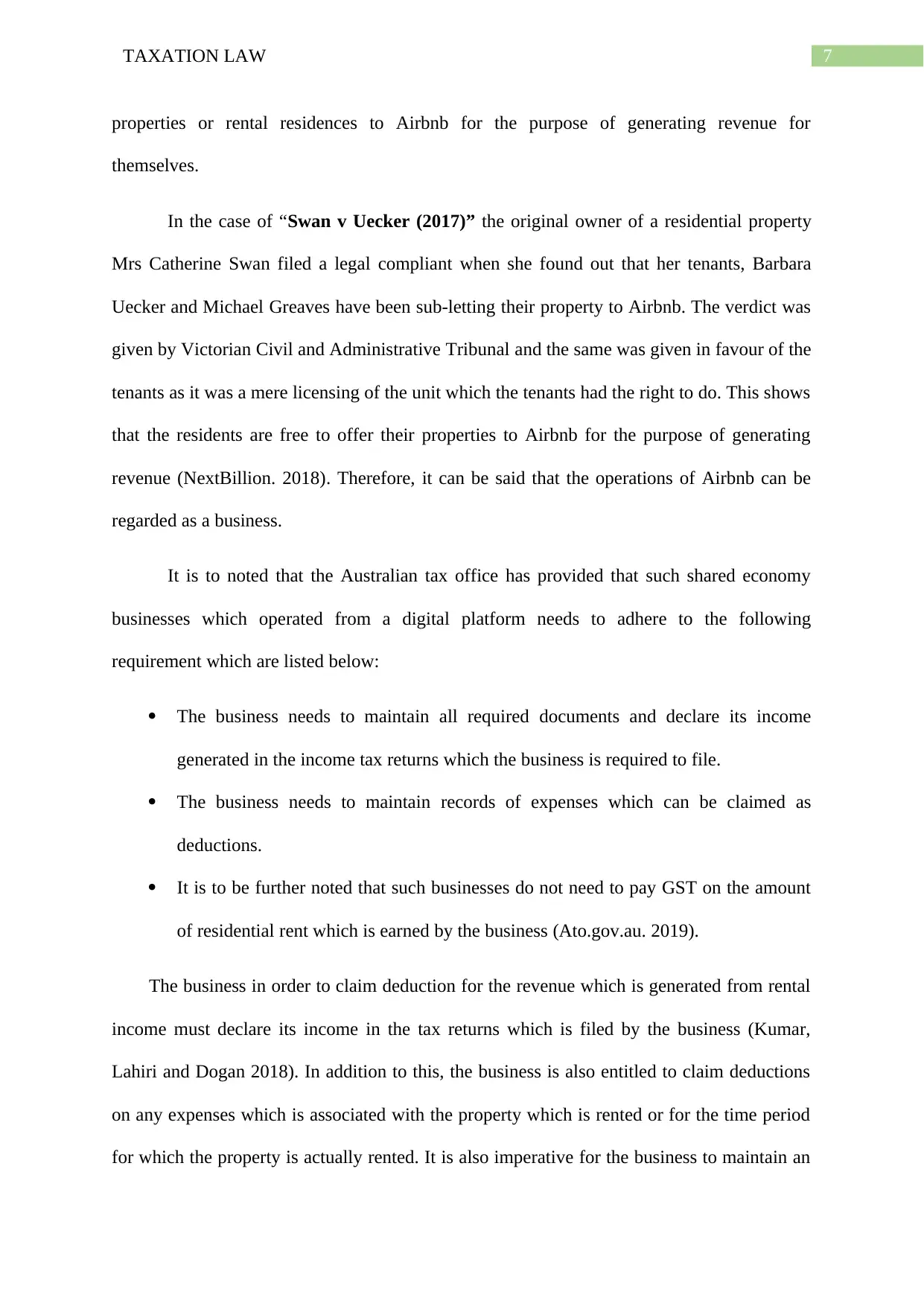
7TAXATION LAW
properties or rental residences to Airbnb for the purpose of generating revenue for
themselves.
In the case of “Swan v Uecker (2017)” the original owner of a residential property
Mrs Catherine Swan filed a legal compliant when she found out that her tenants, Barbara
Uecker and Michael Greaves have been sub-letting their property to Airbnb. The verdict was
given by Victorian Civil and Administrative Tribunal and the same was given in favour of the
tenants as it was a mere licensing of the unit which the tenants had the right to do. This shows
that the residents are free to offer their properties to Airbnb for the purpose of generating
revenue (NextBillion. 2018). Therefore, it can be said that the operations of Airbnb can be
regarded as a business.
It is to noted that the Australian tax office has provided that such shared economy
businesses which operated from a digital platform needs to adhere to the following
requirement which are listed below:
The business needs to maintain all required documents and declare its income
generated in the income tax returns which the business is required to file.
The business needs to maintain records of expenses which can be claimed as
deductions.
It is to be further noted that such businesses do not need to pay GST on the amount
of residential rent which is earned by the business (Ato.gov.au. 2019).
The business in order to claim deduction for the revenue which is generated from rental
income must declare its income in the tax returns which is filed by the business (Kumar,
Lahiri and Dogan 2018). In addition to this, the business is also entitled to claim deductions
on any expenses which is associated with the property which is rented or for the time period
for which the property is actually rented. It is also imperative for the business to maintain an
properties or rental residences to Airbnb for the purpose of generating revenue for
themselves.
In the case of “Swan v Uecker (2017)” the original owner of a residential property
Mrs Catherine Swan filed a legal compliant when she found out that her tenants, Barbara
Uecker and Michael Greaves have been sub-letting their property to Airbnb. The verdict was
given by Victorian Civil and Administrative Tribunal and the same was given in favour of the
tenants as it was a mere licensing of the unit which the tenants had the right to do. This shows
that the residents are free to offer their properties to Airbnb for the purpose of generating
revenue (NextBillion. 2018). Therefore, it can be said that the operations of Airbnb can be
regarded as a business.
It is to noted that the Australian tax office has provided that such shared economy
businesses which operated from a digital platform needs to adhere to the following
requirement which are listed below:
The business needs to maintain all required documents and declare its income
generated in the income tax returns which the business is required to file.
The business needs to maintain records of expenses which can be claimed as
deductions.
It is to be further noted that such businesses do not need to pay GST on the amount
of residential rent which is earned by the business (Ato.gov.au. 2019).
The business in order to claim deduction for the revenue which is generated from rental
income must declare its income in the tax returns which is filed by the business (Kumar,
Lahiri and Dogan 2018). In addition to this, the business is also entitled to claim deductions
on any expenses which is associated with the property which is rented or for the time period
for which the property is actually rented. It is also imperative for the business to maintain an
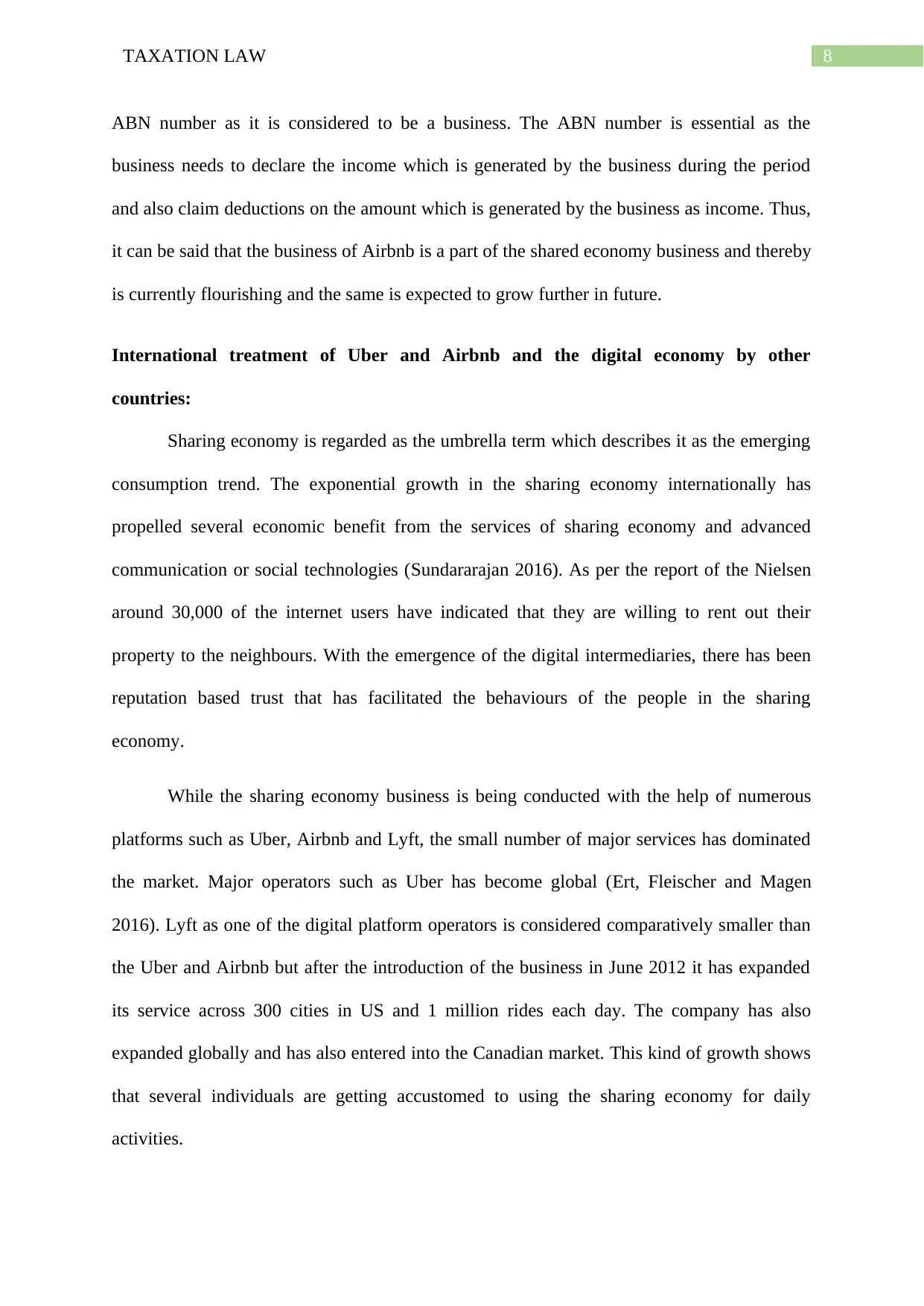
8TAXATION LAW
ABN number as it is considered to be a business. The ABN number is essential as the
business needs to declare the income which is generated by the business during the period
and also claim deductions on the amount which is generated by the business as income. Thus,
it can be said that the business of Airbnb is a part of the shared economy business and thereby
is currently flourishing and the same is expected to grow further in future.
International treatment of Uber and Airbnb and the digital economy by other
countries:
Sharing economy is regarded as the umbrella term which describes it as the emerging
consumption trend. The exponential growth in the sharing economy internationally has
propelled several economic benefit from the services of sharing economy and advanced
communication or social technologies (Sundararajan 2016). As per the report of the Nielsen
around 30,000 of the internet users have indicated that they are willing to rent out their
property to the neighbours. With the emergence of the digital intermediaries, there has been
reputation based trust that has facilitated the behaviours of the people in the sharing
economy.
While the sharing economy business is being conducted with the help of numerous
platforms such as Uber, Airbnb and Lyft, the small number of major services has dominated
the market. Major operators such as Uber has become global (Ert, Fleischer and Magen
2016). Lyft as one of the digital platform operators is considered comparatively smaller than
the Uber and Airbnb but after the introduction of the business in June 2012 it has expanded
its service across 300 cities in US and 1 million rides each day. The company has also
expanded globally and has also entered into the Canadian market. This kind of growth shows
that several individuals are getting accustomed to using the sharing economy for daily
activities.
ABN number as it is considered to be a business. The ABN number is essential as the
business needs to declare the income which is generated by the business during the period
and also claim deductions on the amount which is generated by the business as income. Thus,
it can be said that the business of Airbnb is a part of the shared economy business and thereby
is currently flourishing and the same is expected to grow further in future.
International treatment of Uber and Airbnb and the digital economy by other
countries:
Sharing economy is regarded as the umbrella term which describes it as the emerging
consumption trend. The exponential growth in the sharing economy internationally has
propelled several economic benefit from the services of sharing economy and advanced
communication or social technologies (Sundararajan 2016). As per the report of the Nielsen
around 30,000 of the internet users have indicated that they are willing to rent out their
property to the neighbours. With the emergence of the digital intermediaries, there has been
reputation based trust that has facilitated the behaviours of the people in the sharing
economy.
While the sharing economy business is being conducted with the help of numerous
platforms such as Uber, Airbnb and Lyft, the small number of major services has dominated
the market. Major operators such as Uber has become global (Ert, Fleischer and Magen
2016). Lyft as one of the digital platform operators is considered comparatively smaller than
the Uber and Airbnb but after the introduction of the business in June 2012 it has expanded
its service across 300 cities in US and 1 million rides each day. The company has also
expanded globally and has also entered into the Canadian market. This kind of growth shows
that several individuals are getting accustomed to using the sharing economy for daily
activities.
⊘ This is a preview!⊘
Do you want full access?
Subscribe today to unlock all pages.

Trusted by 1+ million students worldwide
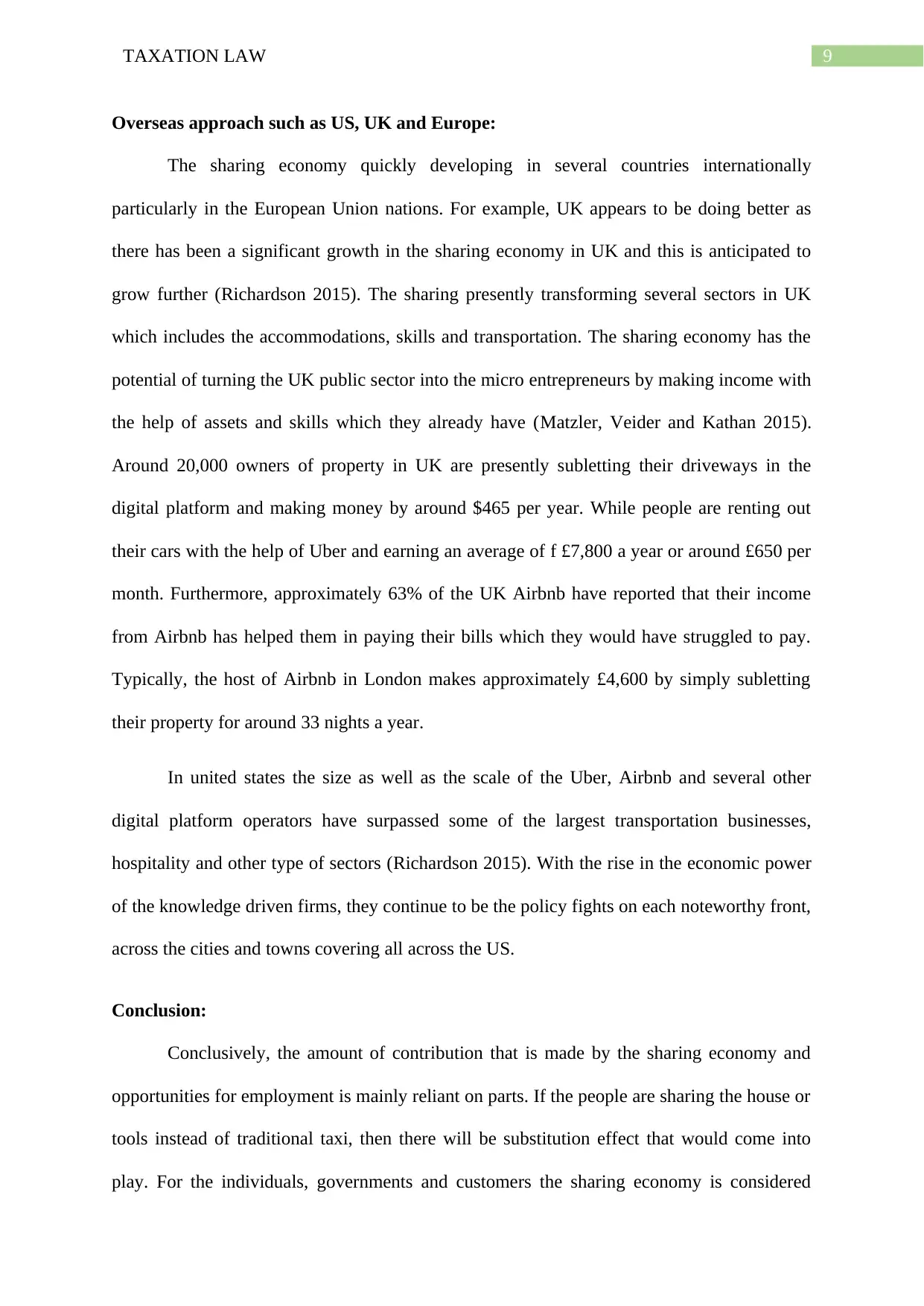
9TAXATION LAW
Overseas approach such as US, UK and Europe:
The sharing economy quickly developing in several countries internationally
particularly in the European Union nations. For example, UK appears to be doing better as
there has been a significant growth in the sharing economy in UK and this is anticipated to
grow further (Richardson 2015). The sharing presently transforming several sectors in UK
which includes the accommodations, skills and transportation. The sharing economy has the
potential of turning the UK public sector into the micro entrepreneurs by making income with
the help of assets and skills which they already have (Matzler, Veider and Kathan 2015).
Around 20,000 owners of property in UK are presently subletting their driveways in the
digital platform and making money by around $465 per year. While people are renting out
their cars with the help of Uber and earning an average of f £7,800 a year or around £650 per
month. Furthermore, approximately 63% of the UK Airbnb have reported that their income
from Airbnb has helped them in paying their bills which they would have struggled to pay.
Typically, the host of Airbnb in London makes approximately £4,600 by simply subletting
their property for around 33 nights a year.
In united states the size as well as the scale of the Uber, Airbnb and several other
digital platform operators have surpassed some of the largest transportation businesses,
hospitality and other type of sectors (Richardson 2015). With the rise in the economic power
of the knowledge driven firms, they continue to be the policy fights on each noteworthy front,
across the cities and towns covering all across the US.
Conclusion:
Conclusively, the amount of contribution that is made by the sharing economy and
opportunities for employment is mainly reliant on parts. If the people are sharing the house or
tools instead of traditional taxi, then there will be substitution effect that would come into
play. For the individuals, governments and customers the sharing economy is considered
Overseas approach such as US, UK and Europe:
The sharing economy quickly developing in several countries internationally
particularly in the European Union nations. For example, UK appears to be doing better as
there has been a significant growth in the sharing economy in UK and this is anticipated to
grow further (Richardson 2015). The sharing presently transforming several sectors in UK
which includes the accommodations, skills and transportation. The sharing economy has the
potential of turning the UK public sector into the micro entrepreneurs by making income with
the help of assets and skills which they already have (Matzler, Veider and Kathan 2015).
Around 20,000 owners of property in UK are presently subletting their driveways in the
digital platform and making money by around $465 per year. While people are renting out
their cars with the help of Uber and earning an average of f £7,800 a year or around £650 per
month. Furthermore, approximately 63% of the UK Airbnb have reported that their income
from Airbnb has helped them in paying their bills which they would have struggled to pay.
Typically, the host of Airbnb in London makes approximately £4,600 by simply subletting
their property for around 33 nights a year.
In united states the size as well as the scale of the Uber, Airbnb and several other
digital platform operators have surpassed some of the largest transportation businesses,
hospitality and other type of sectors (Richardson 2015). With the rise in the economic power
of the knowledge driven firms, they continue to be the policy fights on each noteworthy front,
across the cities and towns covering all across the US.
Conclusion:
Conclusively, the amount of contribution that is made by the sharing economy and
opportunities for employment is mainly reliant on parts. If the people are sharing the house or
tools instead of traditional taxi, then there will be substitution effect that would come into
play. For the individuals, governments and customers the sharing economy is considered
Paraphrase This Document
Need a fresh take? Get an instant paraphrase of this document with our AI Paraphraser
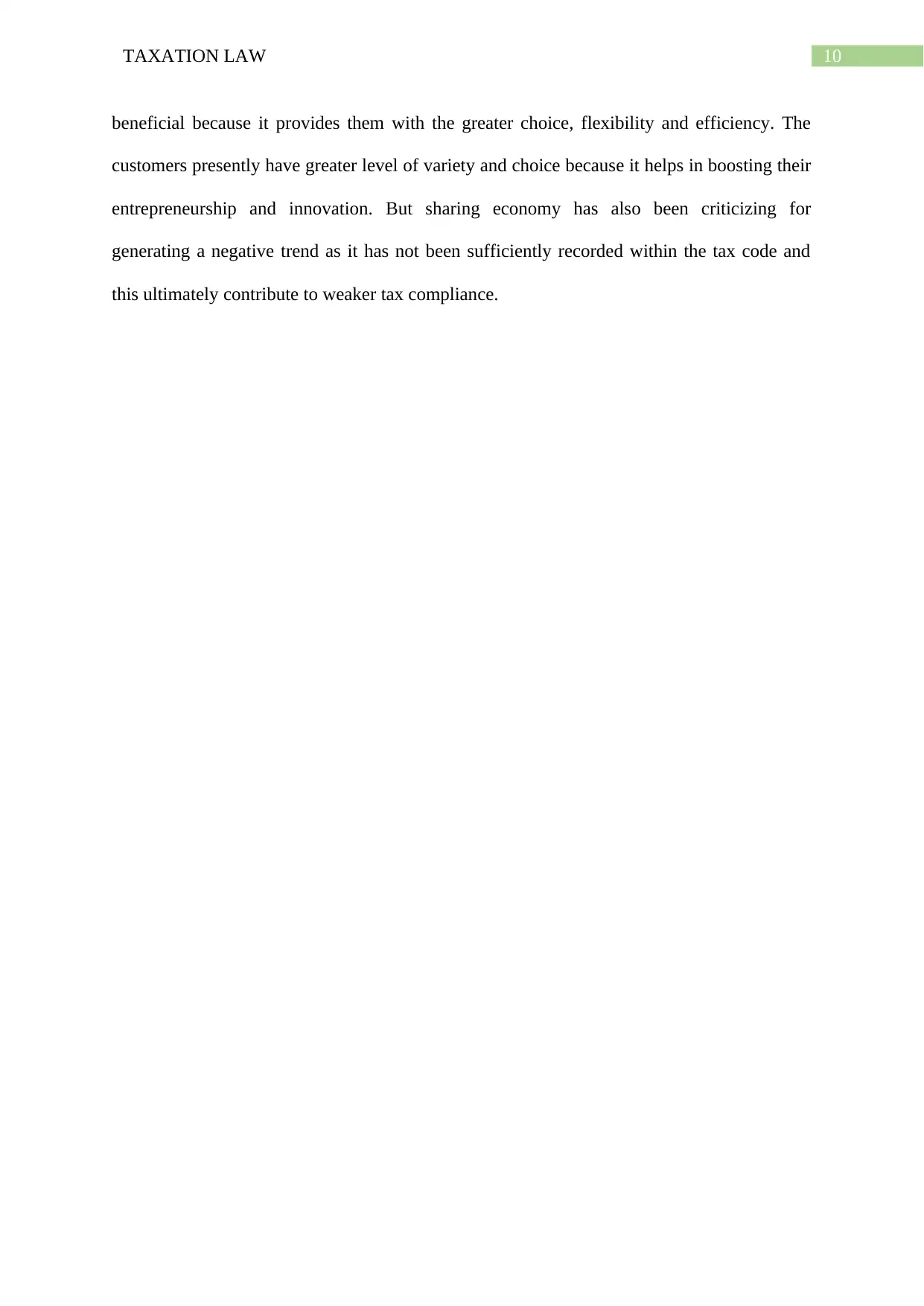
10TAXATION LAW
beneficial because it provides them with the greater choice, flexibility and efficiency. The
customers presently have greater level of variety and choice because it helps in boosting their
entrepreneurship and innovation. But sharing economy has also been criticizing for
generating a negative trend as it has not been sufficiently recorded within the tax code and
this ultimately contribute to weaker tax compliance.
beneficial because it provides them with the greater choice, flexibility and efficiency. The
customers presently have greater level of variety and choice because it helps in boosting their
entrepreneurship and innovation. But sharing economy has also been criticizing for
generating a negative trend as it has not been sufficiently recorded within the tax code and
this ultimately contribute to weaker tax compliance.
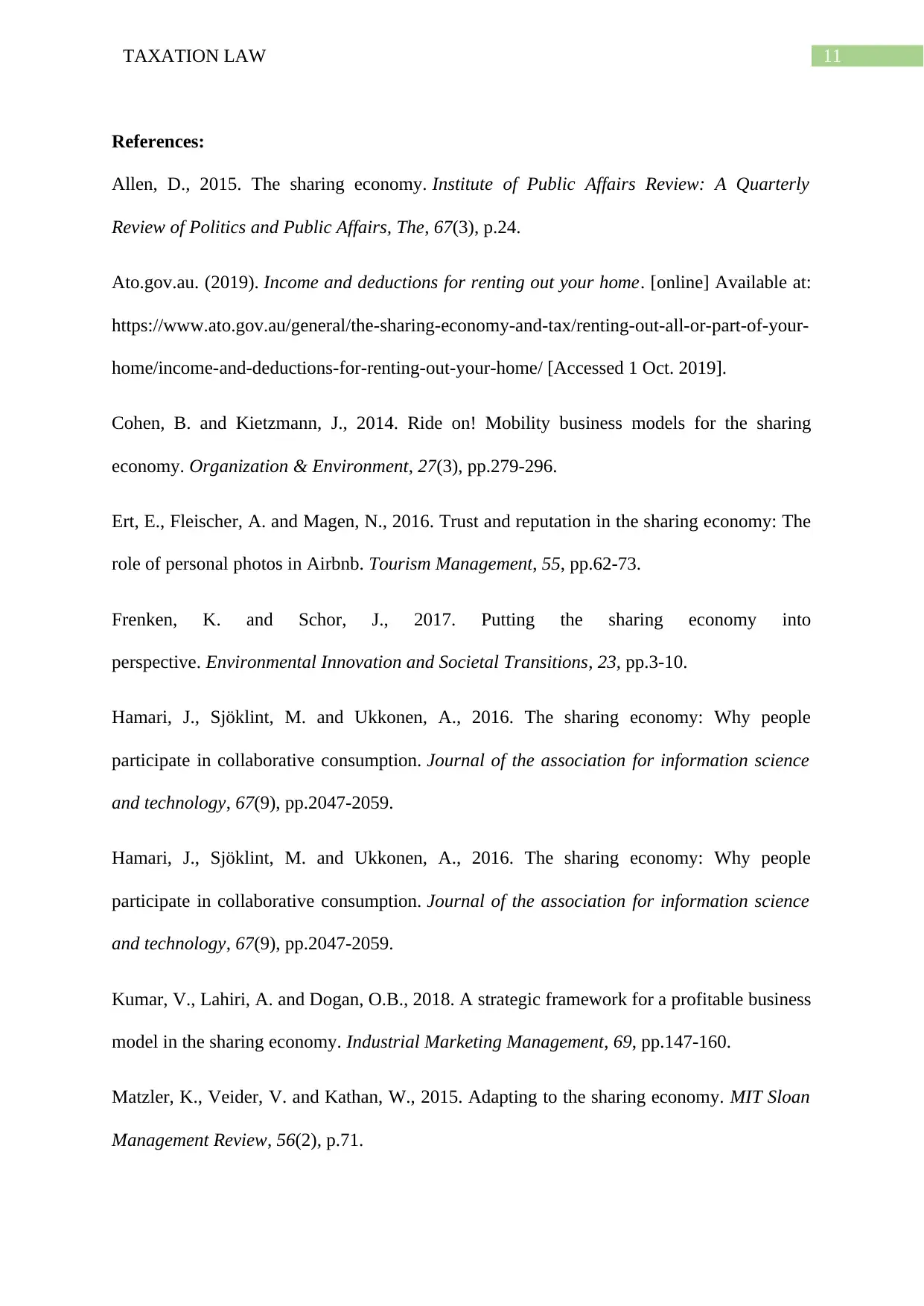
11TAXATION LAW
References:
Allen, D., 2015. The sharing economy. Institute of Public Affairs Review: A Quarterly
Review of Politics and Public Affairs, The, 67(3), p.24.
Ato.gov.au. (2019). Income and deductions for renting out your home. [online] Available at:
https://www.ato.gov.au/general/the-sharing-economy-and-tax/renting-out-all-or-part-of-your-
home/income-and-deductions-for-renting-out-your-home/ [Accessed 1 Oct. 2019].
Cohen, B. and Kietzmann, J., 2014. Ride on! Mobility business models for the sharing
economy. Organization & Environment, 27(3), pp.279-296.
Ert, E., Fleischer, A. and Magen, N., 2016. Trust and reputation in the sharing economy: The
role of personal photos in Airbnb. Tourism Management, 55, pp.62-73.
Frenken, K. and Schor, J., 2017. Putting the sharing economy into
perspective. Environmental Innovation and Societal Transitions, 23, pp.3-10.
Hamari, J., Sjöklint, M. and Ukkonen, A., 2016. The sharing economy: Why people
participate in collaborative consumption. Journal of the association for information science
and technology, 67(9), pp.2047-2059.
Hamari, J., Sjöklint, M. and Ukkonen, A., 2016. The sharing economy: Why people
participate in collaborative consumption. Journal of the association for information science
and technology, 67(9), pp.2047-2059.
Kumar, V., Lahiri, A. and Dogan, O.B., 2018. A strategic framework for a profitable business
model in the sharing economy. Industrial Marketing Management, 69, pp.147-160.
Matzler, K., Veider, V. and Kathan, W., 2015. Adapting to the sharing economy. MIT Sloan
Management Review, 56(2), p.71.
References:
Allen, D., 2015. The sharing economy. Institute of Public Affairs Review: A Quarterly
Review of Politics and Public Affairs, The, 67(3), p.24.
Ato.gov.au. (2019). Income and deductions for renting out your home. [online] Available at:
https://www.ato.gov.au/general/the-sharing-economy-and-tax/renting-out-all-or-part-of-your-
home/income-and-deductions-for-renting-out-your-home/ [Accessed 1 Oct. 2019].
Cohen, B. and Kietzmann, J., 2014. Ride on! Mobility business models for the sharing
economy. Organization & Environment, 27(3), pp.279-296.
Ert, E., Fleischer, A. and Magen, N., 2016. Trust and reputation in the sharing economy: The
role of personal photos in Airbnb. Tourism Management, 55, pp.62-73.
Frenken, K. and Schor, J., 2017. Putting the sharing economy into
perspective. Environmental Innovation and Societal Transitions, 23, pp.3-10.
Hamari, J., Sjöklint, M. and Ukkonen, A., 2016. The sharing economy: Why people
participate in collaborative consumption. Journal of the association for information science
and technology, 67(9), pp.2047-2059.
Hamari, J., Sjöklint, M. and Ukkonen, A., 2016. The sharing economy: Why people
participate in collaborative consumption. Journal of the association for information science
and technology, 67(9), pp.2047-2059.
Kumar, V., Lahiri, A. and Dogan, O.B., 2018. A strategic framework for a profitable business
model in the sharing economy. Industrial Marketing Management, 69, pp.147-160.
Matzler, K., Veider, V. and Kathan, W., 2015. Adapting to the sharing economy. MIT Sloan
Management Review, 56(2), p.71.
⊘ This is a preview!⊘
Do you want full access?
Subscribe today to unlock all pages.

Trusted by 1+ million students worldwide
1 out of 14
Related Documents
Your All-in-One AI-Powered Toolkit for Academic Success.
+13062052269
info@desklib.com
Available 24*7 on WhatsApp / Email
![[object Object]](/_next/static/media/star-bottom.7253800d.svg)
Unlock your academic potential
Copyright © 2020–2026 A2Z Services. All Rights Reserved. Developed and managed by ZUCOL.





